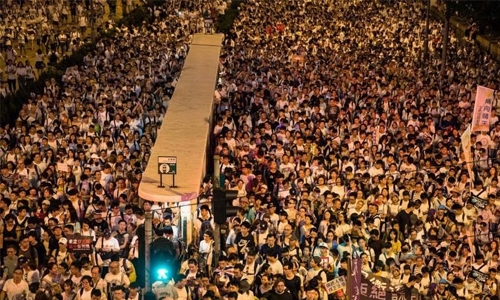‘Million march’ in Hong Kong against China extradition law
Hong Kong witnessed the largest protest since its 1997 handover to China on Sunday as huge crowds massed against plans to allow extraditions to the mainland, a proposal that has plunged the city’s pro-Beijing leaders into a crisis. Organisers said more than a million people marched in blazing summer heat through the cramped streets of the financial hub’s main island in a noisy, colourful demonstration calling on the government to scrap its planned extradition law.
The demonstration was the biggest the international finance hub has experienced since it was returned to China by Britain -- beaten only by a 1.5 million-strong rally during colonial rule in 1989 supporting the Tiananmen protesters. But the proposals have sparked an outcry and birthed an opposition that unites a wide cross-section of the city. “The government cannot ignore these numbers,” protester Peter Chan, 21, said.
“If they really choose not to response to our demands we will not rule out more action.” For more than six hours on Sunday dense crowds snaked their way through the city chanting “Scrap the evil law!” and “Oppose China extradition!”, the lines of white-dressed demonstrators stretching for miles. “There are 1,030,000 people at today’s march,” an organiser told crowds outside the city’s legislature at the march’s end, prompting a cacophony of cheers and applause as new arrivals continued to join.
Police, who historically give much lower figures than organisers, put the peak crowd size at 240,000 -- still their second highest estimate for attendance at a protest since handover. The city ’s population is around 7.3 million and the organiser figure for Sunday’s protest outstripped 2003, when an estimated half a million demonstrators forced the government to shelve a deeply unpopular national security law.
Will crowds sway leaders?
But it is unclear if the financial hub’s current leadership will be moved. The city’s appointed leader Carrie Lam has staked her political reputation on the bill passing. Ignoring the protests could fuel anger or even a return to the unrest of 2014 when pro-democracy protesters took over key intersections of the city for two months. Organisers said Sunday they would “upgrade their actions” if the government did not drop the bill. But backtracking by Lam might embolden opponents and anger Beijing.
Several senior Communist Party leaders in China have voiced support for the bill. In a statement Sunday evening the government described the protest as “an example of Hong Kong people exercising their freedom of expression” but did not signal any compromise, urging legislators to continue debating the bill. Lawyers, business groups, activists, journalists and western powers have all voiced alarm.
Hong Kong’s leaders say the law is needed to plug loopholes and stop the city being a bolthole for mainland fugitives. They say dissidents and critics will not be extradited and have urged the bill’s quick passage to extradite a Hong Kong man who is wanted in Taiwan for murdering his girlfriend. But critics fear the law would entangle people in China’s opaque and politicised court system and say the government is using the Taiwan case as a Trojan Horse.
Related Posts

